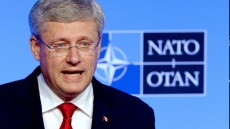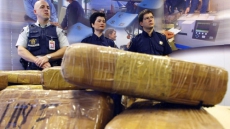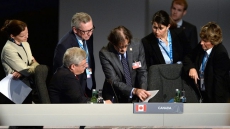The federal government has quietly tightened the rules for travel on special and diplomatic Canadian passports after Stephen Harper ordered a review amid alleged misuse for travel and personal business.
Additional changes could flow out of an ongoing review of who should be eligible for government-sanctioned travel documents.
Diplomatic passports, easily identified by their distinctive red cover, are issued to high-ranking government officials, diplomats and representatives, and Canadian government delegates to organizations or conferences.
Special passports, which have a green cover, are issued to office-holders like MPs, senators, provincial cabinet members, and non-diplomats employed by the government who are travelling on an official mission abroad.
A special or diplomatic passport confirms one's identity and role as an official of the government of Canada. However, only those actually accredited to a foreign country have diplomatic immunity.
Four years ago, a flurry of reports cited examples of supposed improper use of such passports. There were also several cases of parliamentarians being denied entry to holiday destinations, unaware that they needed a visa despite holding a special passport.
Ontario MP Bruce Hyer was turned away by officials after landing in Mexico City in February 2010 for a vacation with some parliamentary business tacked on. Ironically, if Hyer had been travelling with his regular blue-covered passport — not his special green one — he would have been allowed entry.
That October, the prime minister asked Foreign Affairs to review the "efficacy of (Passport Canada's) procedures to ensure the proper use of official passports and preventing their abuse," says a declassified federal briefing note.
In early 2011, Foreign Affairs issued instructions stating "holders of official passports cannot use those passports for travelling on personal business," says the note, obtained by The Canadian Press under the Access to Information Act.
The exceptions are the Governor General, prime minister, diplomats and their authorized dependants, and Privy Council members.
A process was also put in place to help ensure MPs and senators manage safekeeping of their official passports by agreeing in writing to abide by the rules of use, the note says.
In addition, a simplified process was introduced for a holder of an official passport to apply for a regular one.
Responsibility for the passport office has since been transferred to Citizenship and Immigration.
More than 7,400 special passports and almost 2,500 diplomatic passports were issued last year.
Over the last few years, ongoing reviews of the official travel program have resulted in a number of measures to make sure official passports are used properly, said Citizenship and Immigration spokeswoman Sonia Lesage.
"The passport program is always reviewing policies and programs to ensure they are in the best interests of Canadians."
Other steps taken included strengthening procedures for the return of official travel documents once travel is complete, and providing more accessible, clear website information regarding the use of diplomatic and special passports.
Officials are still reviewing the eligibility criteria for official passports as well as the documentation required to support applications, Lesage said.
"This was initiated by officials in December 2012 and is ongoing."





